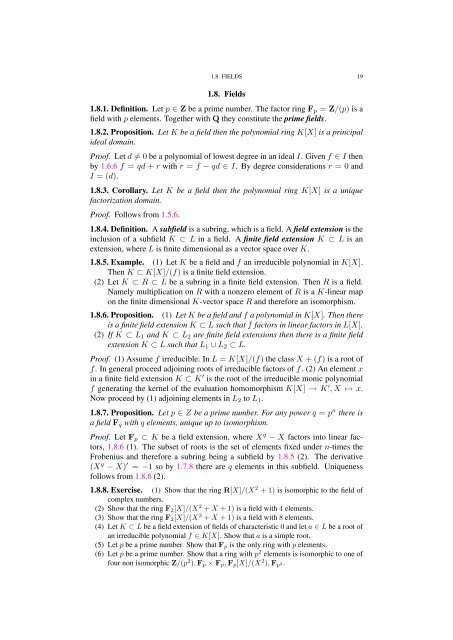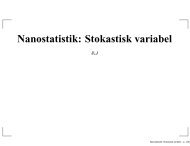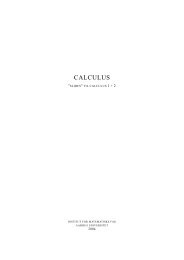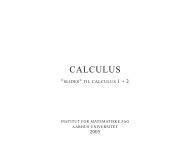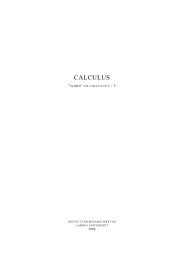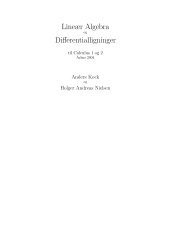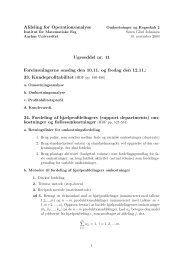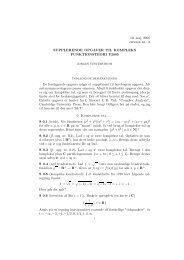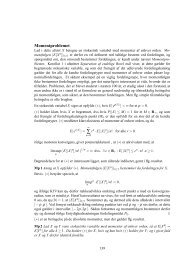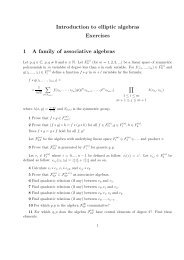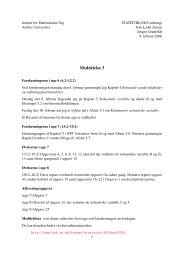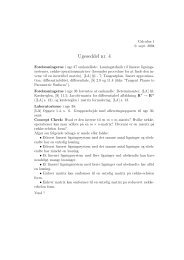Commutative algebra - Department of Mathematical Sciences - old ...
Commutative algebra - Department of Mathematical Sciences - old ...
Commutative algebra - Department of Mathematical Sciences - old ...
Create successful ePaper yourself
Turn your PDF publications into a flip-book with our unique Google optimized e-Paper software.
1.8. FIELDS 19<br />
1.8. Fields<br />
1.8.1. Definition. Let p ∈ Z be a prime number. The factor ring Fp = Z/(p) is a<br />
field with p elements. Together with Q they constitute the prime fields.<br />
1.8.2. Proposition. Let K be a field then the polynomial ring K[X] is a principal<br />
ideal domain.<br />
Pro<strong>of</strong>. Let d = 0 be a polynomial <strong>of</strong> lowest degree in an ideal I. Given f ∈ I then<br />
by 1.6.6 f = qd + r with r = f − qd ∈ I. By degree considerations r = 0 and<br />
I = (d).<br />
1.8.3. Corollary. Let K be a field then the polynomial ring K[X] is a unique<br />
factorization domain.<br />
Pro<strong>of</strong>. Follows from 1.5.6.<br />
1.8.4. Definition. A subfield is a subring, which is a field. A field extension is the<br />
inclusion <strong>of</strong> a subfield K ⊂ L in a field. A finite field extension K ⊂ L is an<br />
extension, where L is finite dimensional as a vector space over K.<br />
1.8.5. Example. (1) Let K be a field and f an irreducible polynomial in K[X].<br />
Then K ⊂ K[X]/(f) is a finite field extension.<br />
(2) Let K ⊂ R ⊂ L be a subring in a finite field extension. Then R is a field.<br />
Namely multiplication on R with a nonzero element <strong>of</strong> R is a K-linear map<br />
on the finite dimensional K-vector space R and therefore an isomorphism.<br />
1.8.6. Proposition. (1) Let K be a field and f a polynomial in K[X]. Then there<br />
is a finite field extension K ⊂ L such that f factors in linear factors in L[X].<br />
(2) If K ⊂ L1 and K ⊂ L2 are finite field extensions then there is a finite field<br />
extension K ⊂ L such that L1 ∪ L2 ⊂ L.<br />
Pro<strong>of</strong>. (1) Assume f irreducible. In L = K[X]/(f) the class X + (f) is a root <strong>of</strong><br />
f. In general proceed adjoining roots <strong>of</strong> irreducible factors <strong>of</strong> f. (2) An element x<br />
in a finite field extension K ⊂ K ′ is the root <strong>of</strong> the irreducible monic polynomial<br />
f generating the kernel <strong>of</strong> the evaluation homomorphism K[X] → K ′ , X ↦→ x.<br />
Now proceed by (1) adjoining elements in L2 to L1.<br />
1.8.7. Proposition. Let p ∈ Z be a prime number. For any power q = p n there is<br />
a field Fq with q elements, unique up to isomorphism.<br />
Pro<strong>of</strong>. Let Fp ⊂ K be a field extension, where X q − X factors into linear factors,<br />
1.8.6 (1). The subset <strong>of</strong> roots is the set <strong>of</strong> elements fixed under n-times the<br />
Frobenius and therefore a subring being a subfield by 1.8.5 (2). The derivative<br />
(X q − X) ′ = −1 so by 1.7.8 there are q elements in this subfield. Uniqueness<br />
follows from 1.8.6 (2).<br />
1.8.8. Exercise. (1) Show that the ring R[X]/(X 2 + 1) is isomorphic to the field <strong>of</strong><br />
complex numbers.<br />
(2) Show that the ring F2[X]/(X 2 + X + 1) is a field with 4 elements.<br />
(3) Show that the ring F2[X]/(X 3 + X + 1) is a field with 8 elements.<br />
(4) Let K ⊂ L be a field extension <strong>of</strong> fields <strong>of</strong> characteristic 0 and let a ∈ L be a root <strong>of</strong><br />
an irreducible polynomial f ∈ K[X]. Show that a is a simple root.<br />
(5) Let p be a prime number. Show that Fp is the only ring with p elements.<br />
(6) Let p be a prime number. Show that a ring with p 2 elements is isomorphic to one <strong>of</strong><br />
four non isomorphic Z/(p 2 ), Fp × Fp, Fp[X]/(X 2 ), F p 2.


